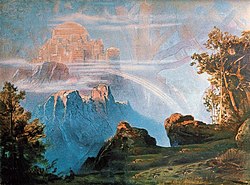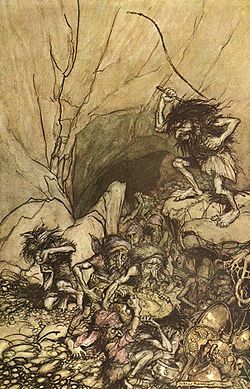DAS RHEINGOLD (Wagner) Opera-Movie Germany 1978 Herbert von Karajan, Thomas Stewart, Peter Schreier, Brigitte Fassbaender
In this video
DAS RHEINGOLD – Der Ring des Niblungen Vorabend by Richard Wagner
Opera-Movie, Studio Munich, Germany
1978
CAST
Thomas Stewart – Wotan
Leif Roar – Donner(singing voice)
Hermin Esser – Froh
Peter Schreier – Loge
Zoltán Kelemen – Alberich
Gerhard Stolze – Mime
Gerd Nienstedt – Fasolt
Karl Ridderbusch -Fasolt(singing voice)
Louis Hendrikx – Fafner
Brigitte Fassbaender – Fricka
Jeannine Altmeyer – Freia
Martha Mödl – Erda
Birgit Finnilä – Erda(singing voice)
Eva Randová – Woglinde(singing voice)
Edda Moser – Wellgunde(singing voice)
Liselotte Rebmann – Flosshilde(singing voice)
___________________________________________________
Conductor: Herbert von Karajan
Berliner Philharmoniker
Stage Director: Herbert von Karajan
Stage Designer: Georges Wakhevitch, Jean Forester
Costume Designer: Georges Wakhevitch, Jean Forester
====================================================
Das Rheingold (pronunciationⓘ; The Rhinegold), WWV 86A, is the first of the four epic music dramas that constitute Richard Wagner’s cycle Der Ring des Nibelungen (English: The Ring of the Nibelung). It premiered as a single opera at the National Theatre of Munich on 22 September 1869, and received its first performance as part of the Ring cycle at the Bayreuth Festspielhaus on 13 August 1876.
Wagner wrote the Ring librettos in reverse order, so that Das Rheingold was the last of the texts to be written; it was, however, the first to be set to music. The score was completed in 1854, but Wagner was unwilling to sanction its performance until the whole cycle was complete; he worked intermittently on this music until 1874. The 1869 Munich premiere of Das Rheingold was staged, against Wagner’s wishes, on the orders of King Ludwig II of Bavaria, his patron. Following its 1876 Bayreuth premiere, the Ring cycle was introduced into the worldwide repertory, with performances in all the main opera houses, in which it has remained a regular and popular fixture.
In his 1851 essay Opera and Drama, Wagner had set out new principles as to how music dramas should be constructed, under which the conventional forms of opera (arias, ensembles, choruses) were rejected. Rather than providing word-settings, the music would interpret the text emotionally, reflecting the feelings and moods behind the work, by using a system of recurring leitmotifs to represent people, ideas and situations. Das Rheingold was Wagner’s first work that adopted these principles, and his most rigid adherence to them, despite a few deviations – the Rhinemaidens frequently sing in ensemble.
As the “preliminary evening” within the cycle, Das Rheingold gives the background to the events that drive the main dramas of the cycle. It recounts Alberich’s theft of the Rhine gold after his renunciation of love; his fashioning of the all-powerful ring from the gold and his enslavement of the Nibelungs; Wotan’s seizure of the gold and the ring, to pay his debt to the giants who have built his fortress Valhalla; Alberich’s curse on the ring and its possessors; Erda’s warning to Wotan to forsake the ring; the early manifestation of the curse’s power after Wotan yields the ring to the giants; and the gods’ uneasy entry into Valhalla, under the shadow of their impending doom.
Synopsis
Prelude
Scene 1
At the bottom of the Rhine, the three Rhinemaidens, Woglinde, Wellgunde, and Floßhilde, play together. Alberich, a Nibelung dwarf, appears from a deep chasm and tries to woo them. The maidens mock his advances and he grows angry – he chases them, but they elude, tease and humiliate him. A sudden ray of sunshine pierces the depths, to reveal the Rhinegold. The maidens rejoice in the gold’s gleam. Alberich asks what it is. They explain that the gold, which their father has ordered them to guard, can be made into a magic ring which gives power to rule the world, if its bearer first renounces love. The maidens think they have nothing to fear from the lustful dwarf, but Alberich, embittered by their mockery, curses love, seizes the gold and returns to his chasm, leaving them screaming in dismay.
Orchestral interlude
Scene 2


Wotan, ruler of the gods, is asleep on a mountaintop, with a magnificent castle behind him. His wife, Fricka, wakes Wotan, who salutes their new home. Fricka reminds him of his promise to the giants Fasolt and Fafner, who built the castle, that he would give them Fricka’s sister Freia, the goddess of youth and beauty, as payment. Fricka is worried for her sister, but Wotan trusts that Loge, the cunning demigod of fire, will find an alternative payment.
Freia enters in a panic, followed by Fasolt and Fafner. Fasolt demands that Freia be given up. He points out that Wotan’s authority is sustained by the treaties carved into his spear, including his contract with the giants, which Wotan therefore cannot violate. Donner, god of thunder, and Froh, god of sunshine, arrive to defend Freia, but Wotan cannot permit the use of force to break the agreement. Hoping that Loge will arrive with the alternative payment he has promised, Wotan tries to stall.
When Loge arrives, his initial report is discouraging: nothing is more valuable to men than love, so there is apparently no possible alternative payment besides Freia. Loge was able to find only one instance where someone willingly gave up love for something else: Alberich the Nibelung has renounced love, stolen the Rhine gold, and made a powerful magic ring out of it. A discussion of the ring and its powers ensues, and everyone finds good reasons for wanting to own it. Fafner makes a counter-offer: the giants will accept the Nibelung’s treasure in payment, instead of Freia. When Wotan tries to haggle, the giants depart, taking Freia with them as hostage and threatening to keep her forever unless the gods ransom her by obtaining and giving them the Nibelung’s gold by the end of the day.
Freia’s golden apples had kept the gods eternally young, but in her absence they begin to age and weaken. In order to redeem Freia, Wotan resolves to travel with Loge to Alberich’s subterranean kingdom to obtain the gold.
Orchestral interlude – Abstieg nach Nibelheim (Descent into Nibelheim)
Scene 3
In Nibelheim, Alberich has enslaved the rest of the Nibelung dwarves with the power of the ring. He has forced his brother Mime, a skillful smith, to create a magic helmet, the Tarnhelm. Alberich demonstrates the Tarnhelm’s power by making himself invisible to better torment his subjects.
Wotan and Loge arrive and happen upon Mime, who tells them of the dwarves’ misery under Alberich’s rule. Alberich returns, driving his slaves to pile up a huge mound of gold. He boasts to the visitors about his plans to conquer the world using the power of the ring. Loge asks how he can protect himself against a thief while he sleeps. Alberich replies the Tarnhelm will hide him, by allowing him to turn invisible or change his form. Loge expresses doubt and requests a demonstration. Alberich complies by transforming himself into a giant snake; Loge acts suitably impressed, and then asks whether Alberich can also reduce his size, which would be very useful for hiding. Alberich transforms himself into a toad. Wotan and Loge seize him, tie his hands, and drag him up to the surface.
Orchestral Interlude – Aufstieg von Nibelheim (Ascent from Nibelheim)
Scene 4
Back on the mountaintop, Wotan and Loge force Alberich to exchange his wealth for his freedom. He summons the Nibelungen, who bring up the hoard of gold. He then asks for the return of the Tarnhelm, but Loge says that it is part of his ransom. Alberich still hopes he can keep the ring, but Wotan demands it, and when Alberich refuses, Wotan tears it from Alberich’s hand and puts it on his own finger. Crushed by his loss, Alberich lays a curse on the ring: until it returns to him, it will inspire restless jealousy in those who own it, and murderous envy in those who do not, thus condemning all the possessors of the ring.
The gods reconvene. Fasolt and Fafner return with Freia. Fasolt, reluctant to release her, insists that the gold be piled high enough to hide her from view. Wotan is forced to relinquish the Tarnhelm, to help cover Freia completely. However, Fasolt spots a remaining crack in the gold, through which one of Freia’s eyes can be seen. Loge says that there is no more gold, but Fafner, who has noticed the ring on Wotan’s finger, demands that Wotan add it to the pile, to block the crack. Loge protests that the ring belongs to the Rheinmaidens, and Wotan angrily declares that he intends to keep it for his own. As the giants seize Freia and start to leave, Erda, the earth goddess, appears and warns Wotan of impending doom, urging him to give up the cursed ring. Troubled, Wotan calls the giants back and surrenders the ring. The giants release Freia and begin dividing the treasure, but they quarrel over the ring itself. Fafner clubs Fasolt to death. Wotan, horrified, realizes that Alberich’s curse has terrible power.
Donner summons a thunderstorm to clear the air, after which Froh creates a rainbow bridge that stretches to the gate of the castle. Wotan leads the gods across the bridge to the castle, which he names Valhalla. Loge does not follow; he says in an aside that he is tempted to destroy the complacent gods by fire – he will think it over. Far below, the Rhinemaidens mourn the loss of their gold and condemn the gods as false and cowardly.
Quoted from Wikipedia
